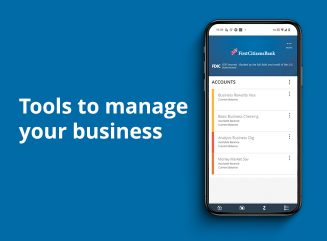
Digital banking for business
Seamlessly access all of your accounts from one place with First Citizens Digital Banking for business.
Many of us are still grappling with what the COVID-19 crisis means for our finances. Social distancing mandates and emergency protocols have brought many industries to a temporary halt, leaving Americans worried about job security. Meanwhile, families are uncertain if they'll face unexpected expenses as they brace for the pandemic's continued effects.

If you're a homeowner, you may be wondering whether you should tap your most important asset—your home—for cash. By understanding how to use home equity smartly and assessing the pros and cons of your different options, you can get a better sense of whether this potential source of cash fits into your strategy for weathering the current economic moment.
There are two common ways to access the equity in your home. The first is a home equity line of credit, or HELOC. With a HELOC, you can draw on your line of credit for various purposes, such as fixing a leaking roof or covering bills while you ride out the pandemic. You don't have to use all the credit at once, which is helpful if you're not sure exactly how much you need.
HELOCs have variable rates, which means that if rates increase, your monthly payments will as well. These rates are based on the prime rateD plus or minus a certain percentage—as the prime rate goes up, so will your payment. So you'll want to be clear on what your rate is and how much it can potentially increase in the future.
The other option is to use your home equity for a fixed-rate home equity loan. You won't have to worry about rate increases, which makes budgeting for your loan payments more manageable. However, you'll receive the money as a lump sum and will start paying on the full amount right away.
There are a few reasons why it might make sense to consider taking advantage of your home's equity at this moment. The first is access to cash.
The amount of equity you have in your home is based on the difference in your home's value and the current mortgage balance. Depending on what that is, you could receive a lump sum of cash or access a substantial line of credit relatively quickly. That can be a huge help if you need to make big repairs on your home or cover a large expense right away.
In addition, using home equity may come with tax benefits. If you use a HELOC or home equity loan for substantial home repairs or upgrades, you may be able to deduct the interest you pay on your taxes.D Your tax advisor will be able to help you identify potential tax benefits.
Lower interest rates are also an attractive feature of this loan option. Because home equity loans and HELOCs are secured by your home, you'll likely get a much better interest rate than you would with a standard personal loan or a credit card.
Taking out a HELOC or home equity loan won't be the right move for everyone. With a variable rate line of credit, your interest rate can increase over time. Make sure you can cover your payments if that happens. If not, your monthly installments could eat up your budget.
In this current economic crisis, it's important to consider your ability to make payments on a loan or line of credit. If you're worried about losing your job or having your hours cut, you may want to consider alternatives that don't use your home to secure a loan.
Lastly, make sure you're not at risk of going underwater on your loan. This occurs when you owe more money on your home than the property is worth. In an uncertain economy, home values can drop, putting homeowners in a tough position. If you borrow against your house and add to your debt load, you could find yourself losing money on the home.
A HELOC allows you to borrow only as much as you need at a given time, so you can be more conservative in your withdrawals and mitigate some risk. But with the variable interest rate, you could still end up with substantial payments that become unmanageable in a moment of crisis.
The most important factor in deciding whether to use home equity is your ability to pay back the loan or credit installments. Because the funds are tied to your home, you want to borrow only as much as you need and only as much as you're comfortable repaying each month.
Email Us
Please select the option that best matches your needs.
Customers with account-related questions who aren't enrolled in Digital Banking or who would prefer to talk with someone can call us directly.